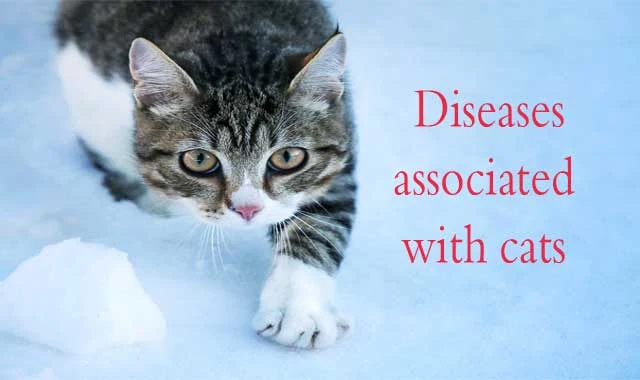 |
| What diseases of cats are transmissible to humans |
WHAT IS CAT DISEASE TRANSMISSIBLE TO HUMANS?
Human-animal infectious diseases are also called zoonotic
diseases. It affects all animals and therefore our pets. Focus on diseases
transmitted by cats to humans.
CAT DISEASES TRANSMISSIBLE TO HUMANS
1- Cat diseases transmitted by the claws
The first is cat scratch disease. It generally occurs on
people under 20 years of age and on immunodeficient people. It is an infection
caused by the Bartonella henselae bacteria, transmitted by fleas. One to three
weeks after the bite or scratch, the first symptoms (redness, glands or
pustule) appear around the injured area.
This disease heals spontaneously in
the majority of cases. The second is pasteurellosis. It is a rarer infection
that affects infants and immunodeficient people. This disease is caused by the
Pasteurella multocida bacillus and is manifested by pain in the wound, in the
hours following the scratch. This can cause infectious symptoms such as fever,
oozing from the wound or edema. To treat pasteurellosis, there are antibiotics
prescribed by the doctor. Read also: Heart Disease in Cats.
2- Cat disease transmissible through skin contact
Transmitted by direct or indirect contact (that is to say,
via hair or even clothing), ringworm is a yeast infection caused by
dermatophyte fungi. There are three forms of ringworms: the clipping ringworm
forms hairless patches, without redness or swelling, the suppurative ringworm
produces large, rounded, swollen and red areas in the hair or the beard, the
favic ringworm manifests itself by small yellowish crusts. It is the
application of creams and / or the taking of antifungal drugs for one month and
a half to two months which make it possible to treat the various forms of
ringworms.
3- Cat diseases transmissible through excrement
Among the diseases that can be contracted by cat feces, are
mainly toxoplasmosis and echinococcosis. Toxoplasmosis is generally mild and
has no particular impact, except for pregnant women and people with weakened or
weakened immune systems. This disease is caused by the Toxoplasma gondii
parasite and is caught on contact with contaminated feces, but also by
ingestion of infected water or uncleaned food.
If people with toxoplasmosis
usually recover on their own, pregnant women should be treated with
antiparasitic drugs, because toxoplasmosis poses real dangers for the
development of the fetus. Echinococcosis is a parasitic disease caused by worms
that develop in the cat's intestine. If cats are carriers without necessarily
developing the disease, however, they can transmit it to humans, with serious
consequences. After an incubation period of a few months to a few years,
echinococcosis attacks the liver and lungs and can be fatal. To protect
yourself from this disease, the solution is to treat your cat with a dewormer. Read also: A Guide to Holistic Cat Care for Feline Lower Urinary Tract Disease.
4- Cat bite-transmitted disease
Cats infected with the rabies virus can transmit it to
humans by biting, scratching or licking their skin if it is scratched or if it
is a mucous membrane. The contraction of the virus is fatal in a few days,
unless vaccination occurs between contamination and the appearance of the first
symptoms. As a preventive measure, vaccination of cats is possible from 3
months. No case of human rabies has been recorded in France since 1924.
OUR ADVICE TO PROTECT AGAINST THE TRANSMISSION OF CAT DISEASE
Since your pet is not immune to transmitting a disease to
you, taking the necessary precautions helps protect against it. In particular
by treating fleas which can contaminate your cat, and by deworming it to avoid
any contact with excrement carrying virus, bacteria and other parasites. It is
also recommended that you wash your hands thoroughly after handling a litter
box. Pregnant women will have every interest in consuming pasteurized foods,
fruits and vegetables well cleaned to protect themselves from cat diseases
transmissible to humans. When in doubt, always consult your doctor.
